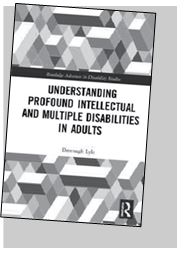Understanding Profound Intellectual and Multiple Disabilities in Adults
Dreenagh Lyle
Routledge, Abingdon, 2019, 184pp, hardback £115; ebook from £21
In this book, Dreenagh Lyle launches a strong critique of what she sees as the marginalisation of people with profound intellectual and multiple disabilities (PIMD) in learning disability policy and practice.
She criticises the Valuing People strategy which, in its drive to ensure its central principles of inclusion, choice and independence, she believes ignored the lifelong specialist care and medical needs of those with the most profound disabilities.
To fit the PIMD group inside an all-embracing policy, we have constructed a fantasy “as if” world in which non-verbal and often sensory-impaired people with very high levels of developmental deficit are deemed capable of expressing an opinion, getting a job, joining communities and achieving independence as those with mild impairments at the other end of the spectrum.
In attempting to be inclusive, this approach becomes exclusionary in denying those with PIMD their own unique personhood, and withholds the specialist support they need to become included people.
The book makes uncomfortable reading for supporters of the social model of disability and for advocates of an all-embracing inclusion model.
Valuing People was inspirational, Lyle agrees, but only for those who could fit its model of what a person with a learning disability should be like. Her argument is an important and convincing challenge to widely held orthodox opinions about social inclusion.
The opening chapters dissect the trajectory of learning disability theory and policy from normalisation to personalisation, leading to what she calls the illusions of Valuing People.
Lyle then uses her experiences as mother of Odyssey, who has PIMD, to outline an approach that places the person.
Simon Jarrett
